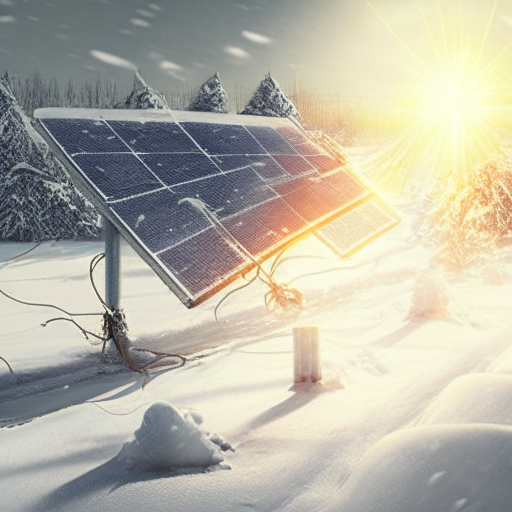Maximize Solar Energy Efficiency in Extreme Cold Weather Conditions
As a dedicated survivalist, you fully recognize the importance of achieving self-sufficiency, especially when faced with the formidable challenges posed by harsh winter weather. One of the primary hurdles you may encounter is the effective utilization of renewable energy solutions during frigid conditions. While the freezing temperatures can seem intimidating, there is no need for alarm! This article aims to uncover the hidden potential of solar power in cold climates. We will reveal practical strategies that empower you to harness solar energy efficiently, even in the most extreme winter environments, by employing a proactive and well-informed approach.

Many people mistakenly believe that solar electricity can only thrive in warm, sun-soaked regions. However, thanks to remarkable advancements in technology, capturing solar energy in colder climates is not only feasible but also efficient. Let’s explore various techniques that enable solar power systems to flourish even in extreme cold, and discover how you can effectively leverage this sustainable, eco-friendly energy source to enhance your lifestyle and survival strategies during the winter months.
To begin with, it is crucial to understand that solar panels generate energy from sunlight rather than heat. While cooler temperatures can influence the efficiency of solar panels, they do not render them ineffective during the winter season. By employing strategic planning and innovative techniques, you can significantly enhance the performance of your solar power system, ensuring it runs optimally even in the coldest climates. A deeper understanding of how solar panels operate across varying temperatures will equip you to make informed decisions about fulfilling your energy needs effectively throughout the winter.
One vital factor in optimizing solar electricity in cold climates is the angle and orientation of your solar panels. Proper alignment can greatly increase the amount of sunlight your panels capture throughout the day. In winter, when the sun’s path is lower in the sky, it becomes essential to tilt your panels at a steeper angle. This adjustment allows for maximal sunlight absorption, thereby enhancing their efficiency. Additionally, orienting the panels towards the south can further improve their sunlight collection capabilities, which is especially advantageous during the shorter days of winter.
Snow accumulation poses a significant challenge in colder regions, as it can obstruct the performance of your solar panels. A heavy layer of snow can drastically reduce electricity output. However, by addressing this challenge proactively, you can implement effective solutions. Consider installing snow barriers or incorporating heating elements on your solar panels to prevent snow accumulation. These enhancements not only facilitate the melting of existing snow but also ensure continuous energy generation, even during snowstorms. Regularly clearing snow by hand is also a practical maintenance strategy to keep your panels functioning at their best and free from obstructions.
Incorporating battery storage systems is a forward-thinking strategy that can significantly boost solar power efficiency in cold conditions. These batteries store excess energy generated during daylight hours for use when sunlight is limited or temperatures drop. The importance of battery storage becomes particularly evident in freezing conditions, as it guarantees a reliable supply of electricity when you need it the most. By investing in a high-quality battery system, you can maintain your energy independence and be well-prepared for any unforeseen circumstances that may arise during severe winter weather.
Choosing the right type of solar panels is crucial for optimizing your solar energy system’s efficiency in cold climates. Certain panels are specifically engineered to perform better at lower temperatures and may incorporate enhanced insulation or specialized materials designed to minimize the effects of frost and ice on their functionality. By making an informed decision about the panel types that are best suited for your cold environment, you can maximize energy production and ensure that your solar power system effectively meets your energy requirements.
In addition to technical considerations, having your solar power system installed by professionals who are experienced in cold climate conditions is essential. Skilled installers can provide valuable insights into best practices for installation, ongoing maintenance, and troubleshooting, which are vital for optimizing your system. Their expertise will ensure that your solar setup operates at peak efficiency, even under the most challenging winter conditions, ultimately enhancing the reliability of your energy source.
Maintaining a proactive and prepared mindset is critical in survival scenarios. While solar power can serve as a reliable and effective energy source in cold climates, having backup generators or alternative energy solutions is essential. These additional measures will act as a safety net in case of extended periods of low sunlight or unexpected system failures. By integrating solar power with other renewable energy sources, you can enhance your energy independence and resilience, ensuring that you are well-equipped to tackle any weather-related challenges that may arise.
Solar energy is not confined to warm and sunny regions; it possesses immense potential even in the coldest climates, provided it is strategically planned and technically advanced. By adjusting your panel angles, mitigating snow accumulation, incorporating battery storage, selecting suitable solar panels, relying on skilled installation, and having contingency plans in place, you can fully unlock the potential of solar energy in extreme cold. Embrace renewable energy with confidence and resourcefulness, securing your survival and sustainability in any climate.
The post Solar Energy in Extreme Cold: Unlocking Its Full Potential appeared first on Survival Bite.
The Article Solar Energy’s Full Potential in Extreme Cold Conditions Was Found On https://limitsofstrategy.com


Comments are closed